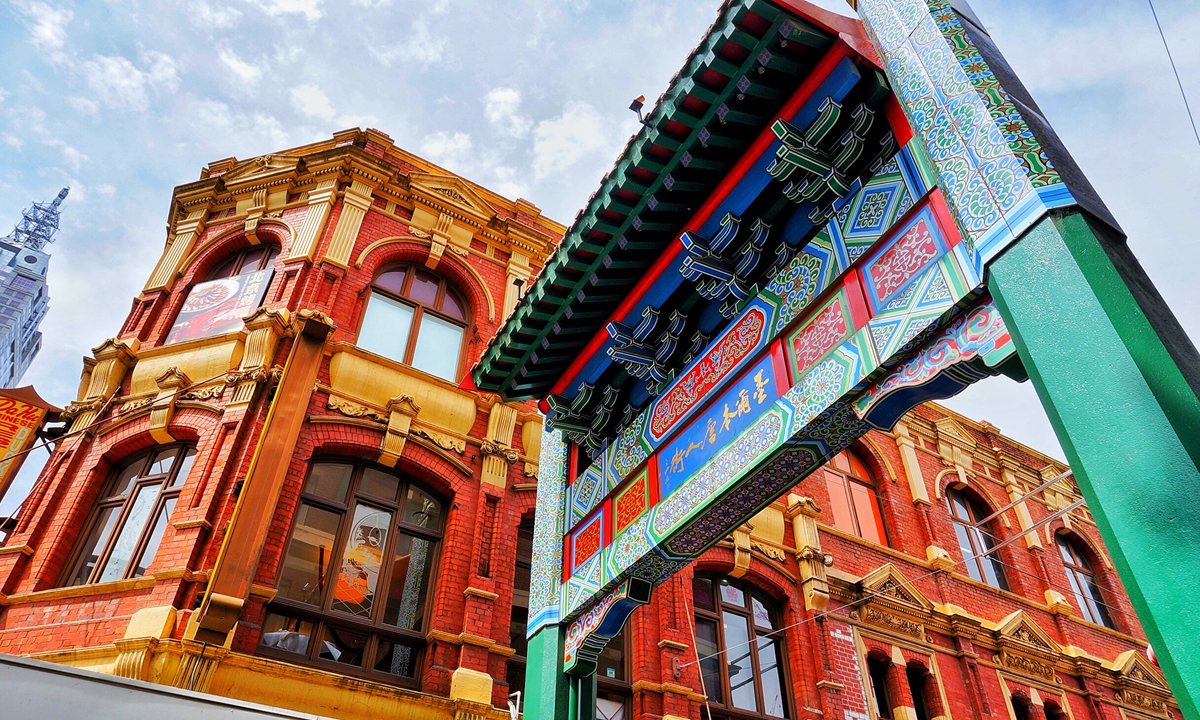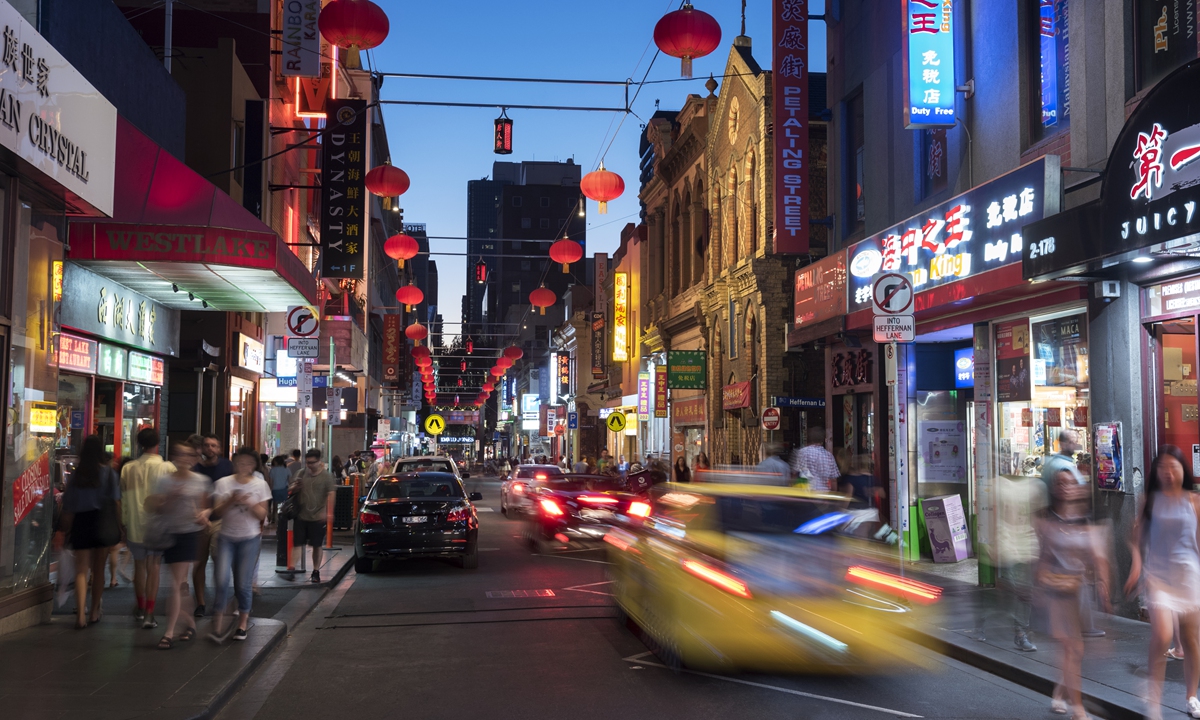Antagonistic policies of Morrison administration harm people-to-people exchanges between China, Australia
By Shan Jie and Lin Xiaoyi Source: Global Times Published: 2020/12/3 21:02:27

The China town of Melbourne. Photo: IC
Amid a vortex of worsening bilateral ties between Australia and China and tightened immigration policies, complicated by the ravages of pandemic, many Chinese in Australia feel anxious and disappointed in Prime Minister Scott Morrison's administration.
Many of them reached by the Global Times expressed reconsiderations of their lives in Australia and may seek to start over back in China.
While data released by the Australian Bureau of Statistics in 2019 shows Chinese immigrants have become the second largest group of immigrants in Australia in 2018, Chinese enthusiasm for immigrating to Australia is sharply waning.
In recent years, Australia has been tightening its immigration policies, including increasing admission standards for skilled immigrants.
According to the Sydney Morning Herald, against the backdrop of uncertainty in China-Australia relations, Australia has also tightened the approvals of citizenship to Chinese. In the first eight months of the 2017-18 fiscal year, the approval rate dropped to less than 3 percent.
Expert said Australia has implemented an erroneous policy toward China and become the most loyal accomplice of the West's anti-China crusade, which has escalated bilateral tensions and harmed not only trade and diplomatic ties, but also the general public.
Changing the plan
Brenda Liu's office overlooks empty streets amid a colorful sunset, but inside is a calendar that is blank from April to December. Brenda Liu has been taking more photos of her daily life in the past weeks. She is recording her last days in Australia, where she has lived for eight years.
Earlier in 2020, while being self-isolated at home in a suburb of Melbourne, Liu finally made up her mind to return to China next February to start a new life in some big cities near her hometown of Jinhua, East China's Zhejiang Province.
But Liu's story is not unusual. In her social circle of Chinese in Australia, she is one of the few still staying there.
"If it is not Australia's COVID-19 restriction policy that forbids residents with green cards and citizens to leave the country, I doubt no one (my Chinese friends) would stay," she said.
Liu said Australia's immigration policy has tightened over the past years. She described rising Sinophobia emanating from the government. "Morrison is a double-dealer. He attacks China, while ingratiates himself with local Chinese community for his political interests," Liu said.
Liu, a graduate with a master degree in engineering, had planned to apply for a green card and devote to her career in the country, but she said her hopes have not panned out.
The pandemic accelerated her bid to leave Australia.

The China town of Melbourne. Photo: IC
"To be honest, even though I have gone through the COVID-19 outbreak in Australia, I still feel insecure. You don't know when it is the next outbreak," she told the Global Times. "In China it is safer, and the economy revives faster. I see opportunities in China."
Liu said all her close friends who lived in Australia are in China now, even those with Australian citizenship. She added that life in China is not only safer and more familiar, but some local governments provide convenience to those who returned.
One of Liu's friends has a 3-year-old son with an Australian passport. The family decided to stay in China due to the pandemic. They could renew the boy's visa conveniently in their hometown.
Li Wana, who has not yet graduated from a post-graduate course in a Melbourne university, is now looking for a job in Beijing as a preschool English teacher.
She has been stuck in Beijing for 11 months since February when Australia issued a travel ban on Chinese students due to the COVID-19 pandemic.
Li had studied in Australia for four years and had planned her life in the country with her apartment in Melbourne. But while staying in Beijing this year, she changed her mind.
"I am worried about the Australian government's policy on China as well as the virus prevention measures," she said. "The travel ban targeting China shows the Morrison administration's cold attitude toward China."
A losing situation
Australia on Thursday passed a legislation, which would allow the federal government to bar the agreements between Australian states and foreign countries, which is believed to be a move to "anger China and intensify a bitter diplomatic spat between the two countries," Reuters reported.
The Australian government first enacted an anti-foreign interference law targeting China, in league with other Western countries, and excluded Chinese tech giant Huawei from its 5G development. Then Australia claimed earlier this year that Chinese spies had infiltrated Australian communities and universities. The Morrison administration has also vilified China on the origins of COVID-19 and social chaos in Hong Kong.
While obsessed with conspiracy theories about Xinjiang under the guise of protecting "human rights," Australian officials have turned a blind eye to atrocities committed by their own soldiers toward Afghan civilians. Leaked documents have revealed Australian war crimes committed in Afghanistan.
When Chinese Foreign Ministry Spokesperson Zhao Lijian denounced Australia's war crimes on his personal Twitter account, Morrison toughly demanded an apology from China while barely addressing the evidence of his military's aggression.

Wuheqilin's work "To Morrison."
The Chinese Foreign Ministry has repeatedly slammed some Australian officials for clinging to Cold War mentality and ideological bias, and regarding China's development as a threat.
"We hope all parties can steadily enhance mutual understanding of each other, view each other correctly and try their best to view others as cooperation partners rather than rivals," Foreign Ministry Spokesperson Hua Chunying said on Wednesday.
"Although Australia claims to be open, inclusive,tolerant and multicultural, they try every means to stir up local anti-China sentiment to hinder the political, economic and cultural exchanges between the two countries. For example, many Chinese scholars and students were subjected to political censorship or even refused visas as they were suspected of being spies without any reason," Chen Hong, director of the Australian Studies Center at East China Normal University in Shanghai, told the Global Times on Thursday.
Chen noted that China has never taken the initiative to provoke Australia, and the two countries have no historical disputes. But instead of reflecting on their role as a ringleader of the US-led anti-China campaign, Australia has continuously sabotaged relations with China, which brought great pressure to Chinese living in Australia.
RELATED ARTICLES:
- China-Australia relations head toward abyss
- Australian 'Soldier Caught Using Dead Taliban Fighter's Prosthetic Leg to Drink Beer'
- Anti-dumping length for Australian wine may be extended to 9 months: Ministry
- Has Australia misjudged US capability to interfere in Asia?
- Expat living in China says he feels ashamed as an Australian